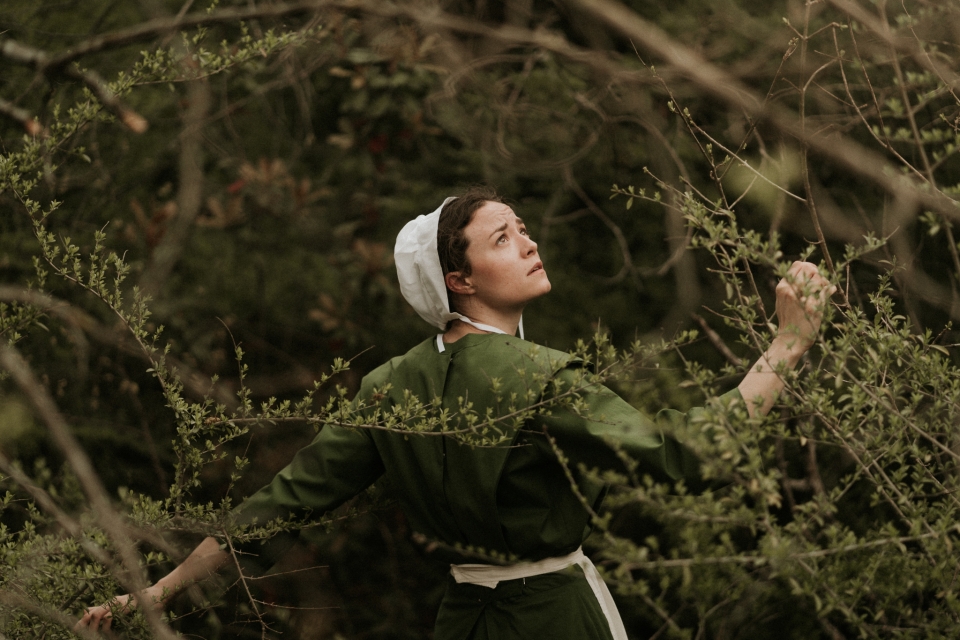by Jan Farrington | April 22, 2019

Addison — Playwright Chelsea Marcantel has found the welcome mat out for her surprising and sharply observed stories at theaters around the country, from New York to Kentucky, Virginia to California. But as far as we (and she) know, Water Tower Theatre’s regional premiere of her play Everything is Wonderful marks the first time her work has crossed over into Texas. Houston is next: Stages Repertory Theatre will end its 2019-2020 season with a run of Marcantel’s prize-winning comedy Airness (about the world of air-guitar competition).
Raised among Cajuns in southwest Louisiana, Marcantel studied English lit and theatre at LSU, decided she was no actress (the faculty, she once wrote, agreed with her) and found she loved a) writing plays, and b) the communal, collaborative nature of theatre itself.
Marcantel based herself in Chicago for several years, working in theater and developing a roster of works through staged readings and festivals. She taught theater at a Virginia college, then moved to NYC to take a Lila Acheson Wallace American Playwrights Fellowship at The Juilliard School. In 2018, Marcantel was given the American Theatre Critics Association’s M. Elizabeth Osborn New Play Award for Airness.
Now based in Los Angeles—with commissions for two musicals (!) and a growing interest in the storytelling possibilities of TV—Marcantel calls herself “a writer, director, and collaborator.” She belongs to The Writers Guild of America and the Dramatists Guild, and in 2018 was invited to become a member of The Kilroys, a bi-coastal collective of playwrights, directors and producers who say they’re “done talking about gender parity” in theatre and working hard to get more of the plays, performances, and points-of-view of female and transgender writers onstage. Their motto: “We make trouble and plays.”
TheaterJones phoned Marcantel at home in L.A. to talk about her life as a playwright, and about Everything is Wonderful—the story of an Amish family, a tragedy, and the unexpected fallout of forgiveness.
The play opens tonight, and is directed by Kelsey Leigh Ervi. The cast includes Kelsey Milbourn, Seth Magill, Blake McNamara, Haley Evans, Jenny Tucker, and Steven Pounders.
TheaterJones: Your work has been getting a look in many parts of the country: New York, Chicago, Los Angeles, Kentucky, Virginia, Washington D.C. and so on. But this is the first play you’ve had produced in Texas, yes? How and when did you and WaterTower Theatre connect?
Chelsea Marcantel: Yes, I think it is my first play in Texas—and Airness is opening in Houston, so it’s actually two plays. And the WaterTower connection is that I’ve known Joanie Schultz, their former artistic director, for a long time, since we both lived in Chicago. She is a very smart, wonderful director, liked the script, and passed it along to the company.
Everything is Wonderful is a story about an Amish family who takes in the man who has caused two deaths in their family. When and how did that idea come to you—was there a true story involved?
I saw a Werner Herzog documentary called From One Second to the Next. It’s about people who have caused an accident while driving, or have had a family member killed. It’s basically a driver’s ed film, quite bleak. And one of the people he interviewed was a guy who was texting while driving, hit an Amish buggy, and killed three children.
The Amish family isn’t interviewed on film, but the father of the family sent the man a letter that was so plainspoken and earnest and compassionate, without being holier-than-thou in any way. He said I pray for you every day, spend all the time you can with your kids, you never will have enough. I was so taken by that. But I also thought, there’s so much forgiveness for this outsider—but aren’t these the same people who excommunicate their kids for listening to Taylor Swift? There’s so little tolerance for deviation within the community. I was fascinated, and spent about a year researching—and then in trying to find a way to tell the story came back to the idea of a car crash. The Amish community is so insular that it would have to be a big, catastrophic event that would allow this man to come in.
And you really are looking at the dichotomy—Eric, the driver of the car, can sit down at the dinner table. But the family has a daughter who is literally an outcast. She can’t come home, sit at the family table, anything.
And the only thing wrong she did was to leave the community after she was baptized. Yet she can’t be forgiven.

I really liked your script—especially how layered you made the portraits of each character. Each of them is complicated and imperfect in different ways; they’re appealing at one moment, less so in others.
The story and characters developed in workshops and readings over the course of several years, so I had a lot of input and help, especially from actors. I think the play is about what happens when you have invested so wholly in a value system, and then something comes up that the value system doesn’t seem able to cover or help with. That’s when the knotty, gnarly interior of people comes to the surface. The answers aren’t simple, especially when you’re used to having them provided. Some people will cling even more tightly to those things at the expense of everything else, and others will maybe think they need to re-examine the way they look at the world.
I especially wanted it to be really hard for the audience to dislike any of the characters, even Abram [who has ‘wronged’ one of the daughters]. I wanted the audience to struggle with wanting to like him.
At one point, one character asks another: “Are you a good person?” There are so many ways these people are trying to be “good,” trying to decide what that even means.
And yet if you truly are a good person, you don’t ask yourself that question. Ruth [the quiet daughter] would never ask herself that question: she just moves through the world, kindly and gently. It’s only when you know you’ve done things you’re not proud of that you have to sit down and weigh your life—looking at the balance sheet to decide if you’re ‘ahead.’
I noticed you using the word ‘tribes’ in something you wrote. Is that the link that runs between the kind of stories you like to tell, that they’re about tribes of one kind of another? Airness is about a world that is, like the Amish community, a kind of closed circle with its own rules.
Yes, that’s exactly what I am interested in—groups that are very American, but exist sort of outside the mainstream, either because they’re purposefully closed and insular like the Amish, or different, like the world of air-guitar competitions or of people who build and live in tiny houses. Not only do those situations provide the fun (at least it’s fun for me) of going to the theater and learning about communities you didn’t know existed—but also it’s a look at people who don’t seem anything like you…but then you find our shared humanity in them.
I’ve had people, specifically after Everything is Wonderful, say to me ‘I didn’t think I was going to have anything to relate to about these people, and then I saw my own family.’ I didn’t grow up Amish, I haven’t had Amish friends—though I do have two Mennonite friends, which is sort of like the Episcopalians to the Catholics….
Amish Lite, in a way? Their lives are less restricted.
But in the end, the play is very much about people I know.
In reading the script, I suddenly recognized myself in Esther, the mother, who seems so calm—but then shows her fierce side. You’ve written more than once that you are interested in humans as ‘small-group primates’—that’s a wonderful phrase.
I heard that said on a podcast, I think, that humans are small-group primates. We may live in huge cities, but truly our social group, the people we care about and with whom we spend most of our time and energy—seems to be groups of 20 to 30 people. Scientists hate it when you, as an artist, take something like that out of context, and then use it to mean something arty.
Have angry anthropologists been accosting you after the play?
Nooo, but I hear things. As a writer, you’re always coming across beautiful words—like ‘the heat-death of the universe.’ So you make something from that and scientists come back and say, ‘That’s not what that means!’ But I totally appropriated the small-group primates idea, because it was so true. I live in Los Angeles, a city of millions, yet the people I care most about come to probably about 20 people.
So your original tribe, to go back to that idea, is Cajun Louisiana. I have a theory going that what Irish playwrights have been to British theatre over the centuries, Southerners, including Cajuns, are to us—they’re our storytellers, for whatever reasons.
Oh, I think you’re spot-on with that. Cajun culture especially is so oral, because for a long time Cajun French wasn’t even a written language. It was passed on orally. It was only around, I think, the ‘50s or ‘60s that the state got around to writing things down, codifying all that, because it was disappearing. But until then, it was a spoken language.
And Southerners, I think we have just invested so much, for better or worse, in our own mythology. And the way we keep that alive and know who we are is by telling stories to each other. We are the people who….x and y. I think that’s beautiful. We’re not the only ones; I lived in Appalachia for a while, and there’s a strong storytelling culture there too. Maybe it’s a feature of isolated, mostly agrarian communities that this is how news travels, how history gets preserved. Inevitably things get embellished and colorized, because good stories have to be entertaining, not just annals.
Embellishment is a way of life in Texas, you know. So the Cajuns were one tribe, but you’ve noted that you’ve lived among several: in Chicago, L.A., New York. Have you picked up ‘stuff’ from these other tribes that has informed your work?
I lived in Chicago after college for about six years. I loved living there because it was very Midwestern and also a big city. But I learned a lot about how to move through a city, how to take up space and assert yourself in a place where you could be overlooked—where no one knows you. And I lived in Virginia for a while, teaching college, and got working in theaters in Kentucky, which was close by. Meeting people from that part of the world, I found they were so much like the people I grew up with. That’s a region defined by natural resources too, and they were coming out into a changing world and an uncertain future.
And then I lived in Manhattan, which is its own world—and by turns the hardest and one of the most beautiful places to live. My New York story is that I was on a train when this guy walked on with another man carrying a suitcase. That guy looked totally lost, didn’t speak any English, and the man with him wasn’t his friend. He didn’t know him at all. But he shoved him onto the train and said: ‘This guy’s going to JFK—you got him?’ And everybody on the train car was like ‘Sure.’ So we all collectively got the man to JFK. New York can be beautiful like that—or it can make you feel invisible. And Los Angeles reminds me of Chicago, it’s very much a city of neighborhoods, and people identify themselves—and stereotype others—by their neighborhood.
I think everywhere I’ve gone, I’ve been asking ‘How do people move through the world here and still retain a sense of self?’ I’ve known lovely people in all those places, and scary ones too.
I read that you are the daughter and granddaughter of librarians. So how come you’re not writing novels?
[Laughs.] I don’t know—I think I just like being around theatre people! As I kid I did community theatre; acting is the gateway drug, that’s how most of us get into this. When I got to college I double-majored in theatre and English, and mostly I was writing poems and short stories. Eventually, though, I thought ‘this isn’t any fun—just me by myself at my computer for hours and hours.’ When I wrote plays, I could be with my friends. It wasn’t solitary. Plays end up being the sum of so many parts and people. My name is on it in the end, but it’s so much better making it with other people, so much more than anything I could come up with completely on my own.
Are you changing as a playwright—or is that something you can step back and see?
I don’t know if I’ve changed as much as I’ve learned to be a little more honest about things. I think when you’re a young writer you get very excited about everything, and frankly about things that come with money attached. You might feel ‘I’m a writer, I can write about anything, so of course I want to write you a play about outer space if you’ll pay me money to do that.’
Now I’ve become much better about saying ‘this is my story to tell, this is not my story to tell.’ It doesn’t matter about the money; if this isn’t my story to tell, I could work on it for years, but it will never be good. I’m starting to write musicals, which is new for me, and I’m trying to transition into TV, which is a whole other landscape. It reminds me of theatre, though, in that it’s all very collaborative.
But I feel my focus is crystallizing and narrowing as I get older. They used to tell us at Juilliard to ask yourself ‘what’s your stuff, what’s your stuff?’ Being a writer doesn’t mean you’re capable of writing anything. It isn’t work for hire. You can’t just think you can put pen to paper and tell all the stories. I diagnosed myself as a ‘small-group primate’ writer; that’s what I’m interested in. I’ll let other people write the Southern Gothic family dramas, and the slapstick comedies. I’m figuring out how to be true to my own voice.







